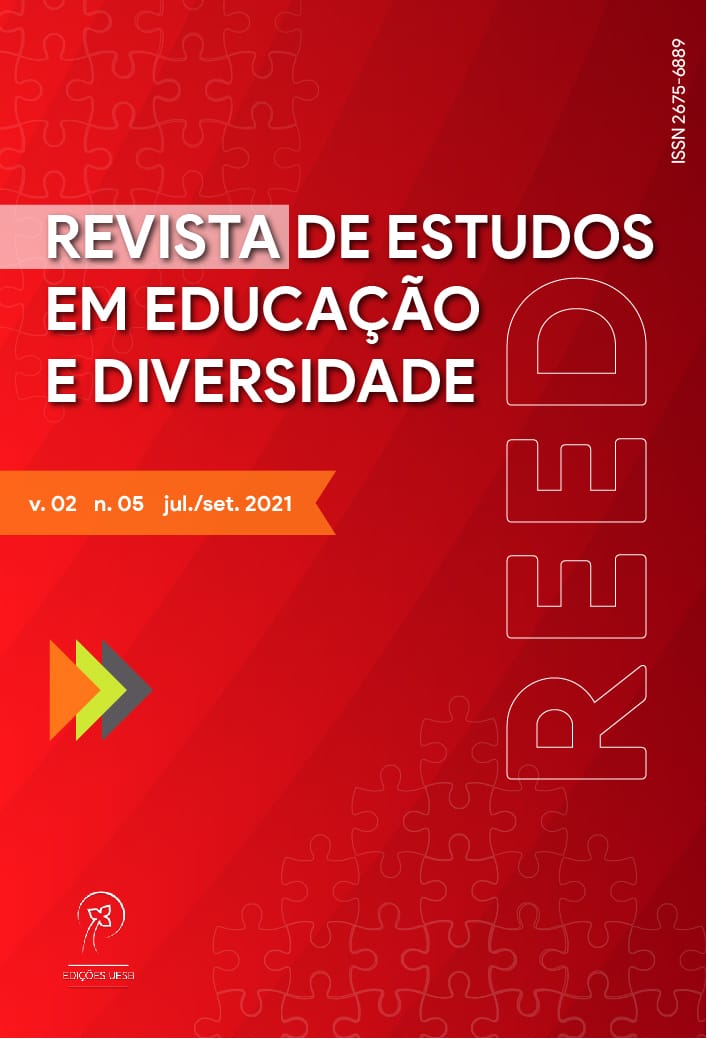FREIREAN TEACHINGS AS GUIDES OF PEDAGOGICAL PRACTICE IN LITERACY AND LITERACY
DOI:
https://doi.org/10.22481/reed.v2i5.9228Keywords:
Literacy, Teacher, SchoolingAbstract
From the early grades, the quality of education should be something common in public educational institutions, allowing children to effectively count on teachers capable of contributing to their integral development, expanding their critical sense, freeing themselves from the shackles of alienation and common oppressor/oppressed relationship in capitalist countries. Therefore, the general objective of this article is to reflect on the contributions of Freire's thought in the literacy and literacy process in the early grades. The literature review, qualitative and descriptive, was used as methodology. The results obtained show that literacy allows children to learn to recognize, decode, form words and sentences with the letters of the alphabet. Literacy, in turn, enables the use of reading and writing in their daily lives. Although literacy and literacy nurture their specificities, both are complementary and inseparable. It is concluded that the teacher needs to read and write their students, so that they appropriate the reading skills that will be carried throughout their lives in the most diverse social contexts. For this, it is necessary to consider their prior knowledge, using generating words that are linked to their daily lives to guide the development of the teaching and learning process, making it more critical, contextualized and emancipating.
Downloads
References
BARTLETT, Lesley; MACEDO, Maria do Socorro Alencar Nunes. Aproximações entre a concepção de alfabetização de Paulo Freire e os novos estudos sobre letramento. Revista Brasileira de Alfabetização, Vitória-ES, v. 1, n. 1, p. 227-236. jan./jun. 2015. Disponível em: https://revistaabalf.com.br/index.html/index.php/rabalf/article/view/46. Acesso em: 10 out. 2020.
FERREIRO, Emília; TEBEROSKY, Ana; LICHTENSTEIN, Diana Myriam. Psicogênese da língua escrita. Porto Alegre: Artmed, 1986.
FREIRE, Paulo. A importância do ato de ler. São Paulo: Cortez/Autores Associados, 1985.
______. Pedagogia do Oprimido. 17 ed. Rio de Janeiro: Paz e Terra, 1987
_____. Pedagogia do compromisso: América Latina e educação popular. 1 ed. Itaiatuba: Villa das Letras Editora, 2008.
_____. Pedagogia dos sonhos possíveis. 1 ed. Rio de Janeiro: Paz & Terra, 2014.
_____. Educação como prática da liberdade. 41 ed. Rio de Janeiro: Paz & Terra, 2017a
_____. Pedagogia da autonomia: saberes necessários à prática educativa. 55 ed. Rio de Janeiro: Paz & Terra, 2017b.
RESENDE, Maria Aparecida; de RESENDE, Tamiris Cristhina. Análise da importância da leitura no processo de alfabetização na concepção de Magda Soares e de Paulo Freire. Revista Linguagens & Letramentos, v. 5, n. 1, p. 07, 2020.
SARDINHA, Patrícia Miranda Medeiros. Letramento crítico: uma abordagem crítico-social dos textos. Revista Linguagem & Cidadania. Universidade Federal de Santa Maria, v. 20, p. 1-17, jan./dez. 2018. Disponível em: https://periodicos.ufsm.br/LeC/article/view/32421. Acesso em: 10 out. 2020.
SILVA, Luiz Carlos R. da; COSTA, Miguel Edigar. M. Alfabetização e letramento nos anos iniciais do ensino fundamental: um caminho a ser trilhado. Revista internacional de audición y lenguaje, logopedia, apoyo a la integración y multiculturalidad, v. 2, n. 3, Julio, 2016. p. 182-191. Disponível em: https://revistaselectronicas.ujaen.es/index.php/riai/article/view/4227. Acesso em: 10 out. 2020.
SILVA, Wagner Rodrigues. Polêmica da alfabetização no Brasil de Paulo Freire. Trabalhos em Linguística Aplicada, v. 58, n. 1, 2019. Disponível em: https://periodicos.sbu.unicamp.br/ojs/index.php/tla/article/view/8654598. Acesso em: 10 out. 2020.
SOARES, Magda. Letramento: um tema em três gêneros. Belo Horizonte: Autêntica, 2001.
Downloads
Published
How to Cite
Issue
Section
License
Copyright (c) 2021 Revista de Estudos em Educação e Diversidade - REED

This work is licensed under a Creative Commons Attribution 4.0 International License.
You are free to:
Share - copy and redistribute the material in any medium or format; Adapt - remix, transform, and build from the material for any purpose, even commercially. This license is acceptable for Free Cultural Works. The licensor cannot revoke these freedoms as long as you follow the terms of the license.
Under the following terms:
Attribution - You must appropriately give credit, provide a link to the license, and indicate if any changes have been made. You may do so in any reasonable way, but not in a way that suggests that you or your use is endorsed by the licensor.
There are no additional restrictions - You cannot apply legal terms or technological measures that legally restrict others to make any use permitted by the license.






